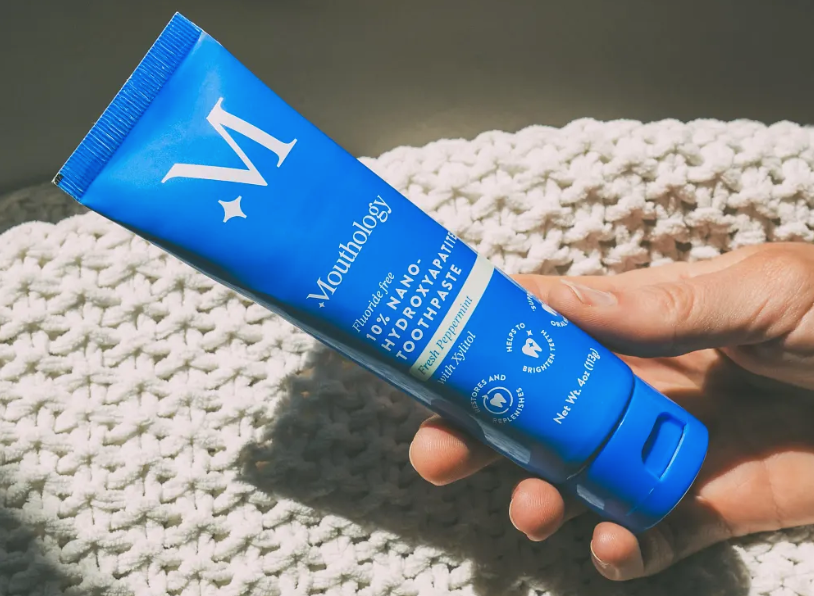There are times we feel the need to scrape our tongue, especially upon waking up in the morning with a bad taste in our mouth or when we have just finished eating a meal. But how often should we really be scraping our tongues?
In general, a dentist would recommend scraping your tongue at least once a day, preferably in the morning before brushing your teeth. This helps to remove any bacteria or debris that may have accumulated on the surface of your tongue overnight.
However, to ensure that bacteria and plaque are not building up, it is also recommended to scrape your tongue twice a day.
Does Tongue Scraper Really Work?
New or not, the doubt will always linger about whether tongue scraping is just a fleeting trend or a necessity for maintaining oral health.
Scientific research underscores that using a tongue scraper is significantly better than brushing your tongue with a toothbrush, primarily because it more effectively removes bacteria, food debris, fungi, toxins, and dead cells from the surface of the tongue.
Unlike toothbrushes, which are designed to clean the relatively smooth surfaces of your teeth, a scraper can reach into the crevices and folds of the tongue to extract unwanted matter. Integrating tongue scraping into your daily brushing routine can complement the traditional regimen of brush and floss, ensuring a more comprehensive approach to oral health.
This practice not only contributes to fresher breath by minimizing bad breath caused by the buildup of organisms but also positively affects your tongue's appearance and overall sensation.
When Should You Use a Tongue Scraper?
As mentioned above, it is recommended to scrape your tongue once a day to promote a better overall oral health routine.
However, certain circumstances may warrant more frequent use of a tongue scraper.
For example, if you have recently been sick or are prone to mouth infections, using a tongue scraper twice a day can help remove the excess bacteria and prevent further complications.
Additionally, those who smoke or consume alcohol regularly may benefit from scraping their tongue multiple times per day to remove any lingering residue that can contribute to bad breath and other oral health issues.
Factors to Consider When Deciding How Often to Scrape Your Tongue
To help you decide the frequency with which you should scrape your tongue, consider the following key factors. These considerations can guide you in establishing a routine that keeps your mouth healthy and helps maintain fresh breath.
Personal Hygiene Goals
Your personal hygiene goals play a crucial role in determining how often you should use a tongue scraper. If your aim is to maintain optimal oral health and ensure that your mouth feels clean throughout the day, incorporating tongue scraping into your morning and evening routines can be beneficial.
This practice helps to remove bacteria and food particles from your tongue, significantly reducing the risk of bad breath and promoting a cleaner oral environment.
Diet and Lifestyle
The foods you eat and your lifestyle choices can affect the amount of bacteria and debris that accumulates on your tongue. Individuals who consume a diet high in sugars and starches may find that bacteria build up more quickly on their tongues, necessitating more frequent scraping.
Similarly, smokers or those who enjoy alcoholic beverages might need to clean their tongues more often to counteract the effects of tobacco and alcohol on oral bacteria levels.
Sensitivity of the Tongue
For some people, the tongue may be more sensitive to mechanical cleaning methods. If you find that scraping your tongue every day causes discomfort or irritation, you may need to adjust the frequency to accommodate your tongue's sensitivity.
Using a gentler tongue cleaner or reducing the frequency of scraping while still ensuring your tongue remains clean can be a good strategy for those with more delicate oral tissues.
Oral Health Status
The condition of your oral health significantly influences how often you should clean your tongue. Individuals with a history of oral health issues, such as gum disease or frequent cavities, might benefit from scraping their tongue more frequently to remove bacteria that could contribute to dental problems.
Conversely, if you have robust oral health and practice good dental hygiene, scraping your tongue once a day may suffice to keep bacteria at bay and support overall mouth health.
Should You Scrape Your Tongue Before or After Brushing Your Teeth?
Now, the question many people have is whether they should scrape their tongue before or after brushing their teeth. A good rule of thumb is to brush or scrape your tongue right after you brush your teeth.
Why? When you brush your teeth, bacteria, and debris are removed from the surface of your teeth and gums. However, some of these microorganisms may find their way onto your tongue during brushing.
By scraping your tongue immediately after brushing, you can remove any remaining bacteria and food particles that may have accumulated on its surface.
What Happens When I Overuse My Tongue Scraper?
Frequent and aggressive use of a tongue scraper can cause irritation, soreness, or even bleeding on the surface of your tongue.
Additionally, overuse may lead to a reduction in the natural protective layer on your tongue's surface, making it more susceptible to bacteria and other harmful microorganisms.
As with any oral hygiene tool, using a tongue scraper should be done carefully and in moderation to avoid potential damage to your oral tissues.
Quick Tips on How to Use Your Tongue Scraper
- Start at the Back: Begin by positioning the tongue scraper at the far back of your tongue. This ensures that you cover the entire area where most of the tongue coating accumulates.
- Gentle Pressure: Apply gentle pressure as you glide the scraper towards the front of your mouth. This prevents irritation while effectively removing the coating.
- From the Center to the Edges: Start scraping from the center of your tongue, moving towards the edges. This technique helps in thoroughly cleaning the entire tongue surface.
- Rinse After Each Stroke: After each stroke, rinse the scraper under warm water to remove the debris. This practice ensures that you're not re-depositing the tongue coating back onto your tongue.
- Repeat as Needed: Depending on the amount of buildup, you may need to repeat the scraping motion several times. Focus on areas with visible coating or where you feel there’s more accumulation.
- Don’t Forget the Tip: While the majority of the focus is on the middle and far back of your tongue, don’t neglect the tip of your tongue. It can also harbor bacteria and residues.
- Rinse Your Mouth: After you’ve finished scraping, rinse your mouth with water or an antibacterial mouthwash to remove any loosened debris and freshen your breath.
- Clean Your Scraper: Thoroughly clean your tongue scraper with hot water and soap, or a disinfectant after use. Proper sanitation is crucial to avoid introducing bacteria into your mouth the next time you use it.
By following these tips, you ensure your tongue is clean, contributing to overall oral health and fresher breath.
Key Takeaways
Consistency is key if you want to maintain a clean and healthy tongue. While there is no one-size-fits-all approach to how often you should scrape your tongue, considering factors such as personal hygiene goals, diet and lifestyle, the sensitivity of the tongue, and oral health status can help guide your routine.
Remember to use gentle pressure when scraping and rinse your mouth thoroughly after each stroke. And most importantly, don't forget to clean your tongue scraper regularly to avoid reintroducing harmful bacteria into your mouth.
For quality and effectiveness, choose Mouthology's Double Handle Tongue Scraper, designed for easy use and thorough cleaning. Made from stainless steel, it's a durable option that can last for years. Invest in your oral health today and welcome tomorrow with a fresh and healthy mouth.
Why wait? Get your tongue scraper today and take the first step towards better oral hygiene!

